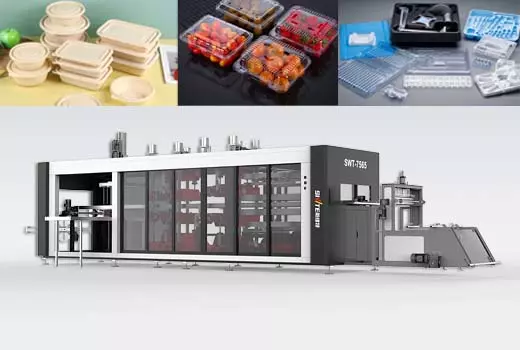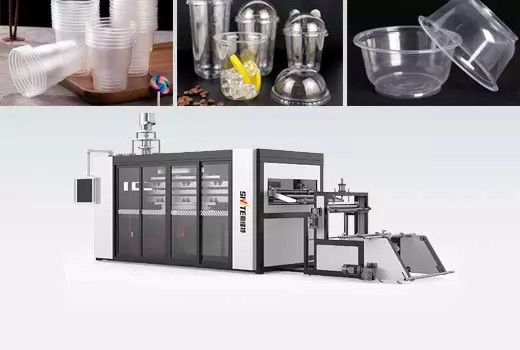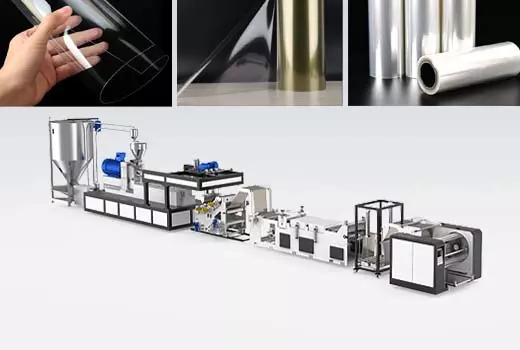What is PET sheet extrusion line?
The PET sheet extrusion line is a fully automated line for extruding polyethylene terephthalate (PET) sheets. It is suitable for APET, CPET, and PETG materials, producing PET sheets with thicknesses ranging from 0.15 to 2.0 mm. The process involves melting PET pellets and continuously extruding them through a specially designed die to form sheets. These sheets are then cooled, trimmed, and cut to the desired thickness and size for further processing or use in industries such as packaging, printing, and medical.
SIVITE offers a variety of PET sheet extrusion solutions, including single-screw, twin-screw, multi-layer co-extrusion, and planetary screw PET sheet extruders, depending on the customer's PET raw material (virgin or recycled), extrusion volume, specifications, and other requirements. As a leading manufacturer of sheet extruders, SIVITE EXTRUSION will guide you in making the right choice.

What can you do with it?
PET sheet extrusion lines can produce a variety of sheet types, primarily including the following:
1. Basic PET Sheet
* APET (Amorphous PET): Highly transparent and easy to form, widely used in food packaging (such as blister packs and trays), toy and gift packaging, etc.
* PETG (Modified PET): Offers improved toughness and chemical resistance, suitable for medical device packaging, stationery, furniture films, electronic product casings, etc.
* RPET (Recycled PET): Processed from recycled material, supporting the environmentally friendly industry, commonly used in packaging materials (such as hardware tool packaging and clothing hang tags).
2. Multi-Layer Composite Sheet
* Co-extrusion technology using multiple extruders to produce multi-layer structures, such as:
* APET/PETG or PETG/APET/PETG: Combining the performance advantages of different layers, suitable for demanding food packaging and printed products.
* APET/RPET/APET: The outer layer is APET to ensure appearance, while the middle layer uses recycled material to reduce costs, suitable for environmentally friendly packaging.

3. Special Function Sheet
* CPET (Crystalline PET): Excellent high-temperature resistance, used in thermoformed products such as microwave lunch boxes.
* Optical-grade PET Sheet: High transparency and low haze, used in LCD light guide plates, optical lenses, and more.
* 3D Sheet: Formed through vertical rollers, used for three-dimensional packaging or decorative materials.
4. Environmentally Friendly and High-Performance Sheet
* Drying-Free Sheet: Twin-screw degassing technology allows direct processing of PET feedstock with a moisture content of 1%, reducing energy consumption and making it suitable for recycled material production.
* High-Productivity Sheet: Some equipment can achieve outputs of 800-1000 kg/h, suitable for large-scale production needs.
Can it only produce PET?
Because it's called a PET sheet extrusion line, some people might assume it's limited to PET. This isn't the case. It can also produce other materials, such as PLA, PP, and PS. However, the design should consider the possibility of multiple materials being used, and pre-designed to accommodate the possibility of changing materials later. While technically feasible, as a sheet extruder manufacturer, we don't recommend this practice. For more information, please contact a SIVITE EXTRUSION engineer for a detailed explanation.
Self-developed and mastering core technologies
Diverse screw design options
The use of precision screw design (single screw, twin screw, planetary combination screw solutions) and an efficient melting system can achieve a stable output of 800~1500kg/h, 24-hour uninterrupted operation, reducing downtime for material changes, and is suitable for large-volume order needs.
More energy-efficient
This high-efficiency screw design (L/D ≥ 30:1) and waste recycling system reduce energy consumption by 15-20% compared to traditional processes. It supports 100% recycled PET (rPET) processing, contributing to a circular economy. The integrated PLC control system monitors parameters such as melt pressure (±1 bar) and temperature (±1°C) in real time, enabling remote fault diagnosis.
Excellent extrusion quality
High-precision sheet production with a thickness tolerance of ±0.02mm is possible. Crystallinity and molecular chain orientation are controllable, resulting in superior tensile strength and transparency (>90%). Online thickness monitoring and automatic deviation correction systems reduce defects, and over 97% of scrap material is instantly shredded and recycled.


1. Extrusion Screw
The core component that plasticizes raw materials through controlled heating and mechanical shear.According to the different materials produced, it can be divided into single screw, twin screw and planetary combination screw.

2. Extrusion Mold
A precision system where plasticized material first passes through a screen changer (for impurity filtration), then through a metering pump for precise volumetric control, before being distributed via flow channels to the die for final sheet formation.

3. Three-Roll Calender
Immediately cools and shapes the extruded sheet through precisely temperature-controlled rollers, ensuring dimensional stability and surface quality.

4. Thickness Gauge
Provides 24/7 real-time thickness measurement with closed-loop feedback control to maintain consistent sheet gauge throughout production.

5. Silicone Coating Unit (Optional)
Applies a release agent layer for thermoforming applications (improving mold release) or functional coatings (like anti-static treatments). Often paired with the drying oven system.

6. Multi-stage oven
Typically configured with 2-4 heating zones (depending on material requirements) to rapidly dry coated sheets before winding. Ensures proper coating curing without affecting sheet properties.

7. Accumulation Buffer
STemporarily stores sheets through adjustable web paths, preventing material damage or contamination during downstream equipment transitions or winding delays.

8. Winding Machine
Available in semi-automatic or fully automatic configurations to produce tightly wound, edge-aligned rolls. Ensures optimal material handling for storage and subsequent thermoforming processes.
Sheet extrusion production line working video
This extruder features a simple structure, low cost, and easy maintenance. It's suitable for standard PET sheets or low-capacity production (e.g., thicknesses of 0.2-2mm). However, it requires a high-efficiency crystallization and drying system and exhaust design, resulting in relatively high power consumption. Its mixing and plasticizing capabilities are relatively weak, requiring high raw material purity. It is prone to degradation and is not suitable for processing highly filled or recycled PET.
Co-rotating twin-screws: Provide strong shear forces and are suitable for highly filled, rPET, or modified PET (e.g., with added flame retardants or glass fiber). Counter-rotating twin-screws: Provide stable conveying and are suitable for high-viscosity PET.Twin-screw extruders use two parallel or interlocking screws to propel the material. They offer strong mixing and melting capabilities and are suitable for processing complex materials.
This machine utilizes a combination of single and planetary screws. The rotation of the planetary screws helps improve material mixing uniformity. The multi-screw planetary design provides exceptional mixing and plasticizing capabilities. It extrudes at low temperatures (reducing thermal degradation). Even with recycled materials, it can produce sheets with high transparency and toughness. This machine is primarily designed for the production of high-end PET sheets.
Multi-layer coextrusion, in simple terms, consists of several layers. Common examples include two-layer, three-layer, and five-layer coextrusion. Multiple extrusion screws are required to achieve this. Depending on the material type, these structures are generally referred to as ABA or ABC. These structures can incorporate the properties of different materials (such as barrier layers and adhesive layers). Common combinations include: PET/PE/PP: low-cost moisture barrier; PET/EVOH/PET: high oxygen barrier (food packaging); and PET/rPET/PET: environmentally friendly recycled structures. These structures are suitable for producing PET sheets requiring multi-layer functionality or special properties, such as high-barrier packaging materials and UV-resistant sheets. To reduce raw material costs, manufacturers are now using recycled material as filler in the sheet to reduce costs. Multi-layer coextrusion is the optimal solution.
| Model | Adaptive material | Screw structure | Specifications(mm) | Thickness(mm) | Width(mm) | Extrusion Volume(kg/h) |
| SWT-120D | PET,PLA,PP,PS,PE,PC.... | Single screw | φ120 | 0.15~2.0 | ≤1200 | 400~500 |
| SWT-130D | PET,PLA,PP,PS,PE,PC.... | φ130 | 0.15~2.0 | ≤1200 | 500~700 | |
| SWT-150D | PET,PLA,PP,PS,PE,PC.... | φ150 | 0.15~2.0 | ≤1200 | 800~1200 |
| Model | Adaptive material | Screw structure | Specifications(mm) | Thickness(mm) | Width(mm) | Extrusion Volume(kg/h) |
| SWT-75S | PET,PLA,PP,PS,PE,PC.... | Twin screw | φ75 | 0.15~1.8 | ≤1200 | 500~700 |
| SWT-85S | PET,PLA,PP,PS,PE,PC.... | φ85 | 0.15~1.8 | ≤1200 | 800~1000 | |
| SWT-95S | PET,PLA,PP,PS,PE,PC.... | φ95 | 0.15~1.8 | ≤1200 | 1000~1500 |
| Model | Adaptive material | Screw structure | Specifications(mm) | Thickness(mm) | Width(mm) | Extrusion Volume(kg/h) |
| SWT-120X | PET,PLA,PP,PS,PE,PC.... | Single screw + planetary screw (combination) | φ120 | 0.15~2.0 | ≤1200 | 400~600 |
| SWT-130X | PET,PLA,PP,PS,PE,PC.... | φ130 | 0.15~2.0 | ≤1200 | 600~1000 | |
| SWT-150X | PET,PLA,PP,PS,PE,PC.... | φ150 | 0.15~2.0 | ≤1200 | 1000~1500 |
PET multi-layer co-extrusion equipment parameters
| Model | Adaptive material | Screw structure | Specifications(mm) | Thickness(mm) | Width(mm) | Extrusion Volume(kg/h) |
| 2-layer co-extrusion | PET,PLA,PP,PS,PE,PC.... | Multi-screw (customized) | φ75+65 | 0.15~2.0 | ≤1200 | 500~700 |
| 3-layer co-extrusion | PET,PLA,PP,PS,PE,PC.... | φ75+65 | 0.15~2.0 | ≤1200 | 700~1000 | |
| 5-layer co-extrusion | PET,PLA,PP,PS,PE,PC.... | φ85+65+65 | 0.15~2.0 | ≤1200 | 1000~1300 |
In what fields can it be applied?
Food industry
We can produce fast food boxes, plastic bowls and plates, biscuit boxes, pastry packaging boxes, fresh food trays, and fruit fresh-keeping boxes such as strawberries, blueberries, and cherries.
Medical industry
It can produce disposable syringe packaging, Tyvek packaging boxes, medical trays, pharmaceutical blister packaging, and medical device housings such as monitors and ventilators.
electronics industry
It can produce electronic pallets, as well as outer packaging and inner pallets for electronic products such as mobile phones, tablets, smart watches, Bluetooth headsets, game controllers, etc.
Cup making industry
We can produce coffee cups, milk tea cups, drinking cups, disposable dishes, milk cups, jelly cups, ice cream cups, disposable beverage cups, etc., as well as their matching cup lids.
automotive industry
Interior parts: instrument panel, door panel, roof, seat shell; exterior parts: bumper, fender, wheel arch, roof luggage box shell; functional parts: battery module shell, motor shell, ventilation duct, etc.
Packaging industry
It can produce cosmetic linings, gift boxes, wine packaging boxes, table and chair panels, cabinet decorative layers, advertising light boxes, as well as various packaging blisters for toothbrushes, toys, etc.
Customers also asked about these related machines



